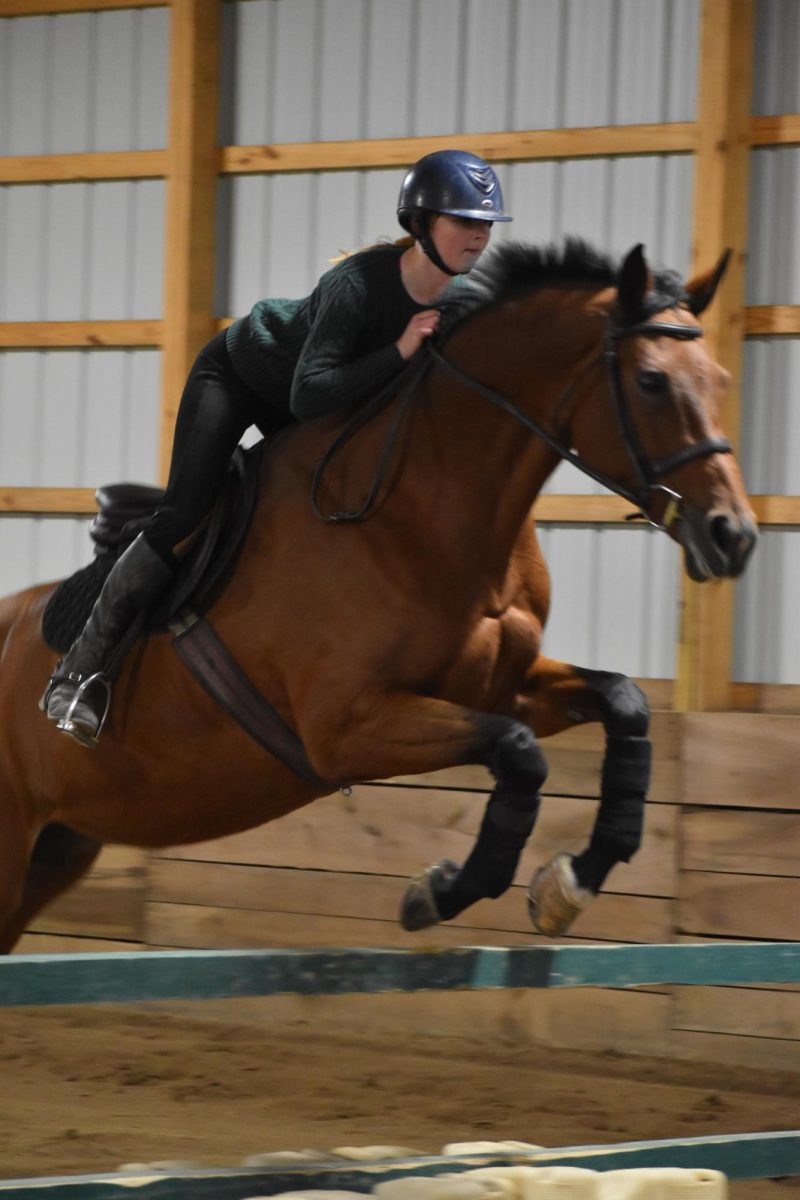
By Kendall Harshberger and Priya Patel
<[email protected]> <[email protected]>
Every weekend Anita Wang, co-president of the Paws4Cause club and junior, spends her time volunteering at the Hamilton County Humane Society in Noblesville. She has been volunteering there since the summer, helping out at the front desk greeting the guests, cleaning the cages and working with the animals.
Recently, she said she has seen an increase in the amount of animals coming into the Humane Society and a decrease in animals being adopted. With this combination, the Humane Society is quickly becoming overfilled. The last time Wang was at the society, she said there were about 15 to 18 new animals that had been brought in, but only one was adopted during that particular weekend.
“You can see how many extra animals are coming in because they’ve filled all of the kennels, and there are many cages by the front desk,” said Wang.
According to Mandy Maxwell, Community Outreach Coordinator for the Hamilton County Humane Society, the shelter has become so full because they function as an open-admission facility, which means no animals are turned down.
“We’re a no-refusal shelter, so we’ll take in any animal, no matter what has happened to it,” Maxwell said.
This causes significant financial strain on the shelter. The state government pays for an animal’s cost of living for the first week (about $20 each day), but afterwards, the shelter must come up with its own funding until the animals are adopted.

Because of this fact, the shelter was recognized by a Maddie’s Fund, a pet rescue foundation, for coming up with innovative ways to help hard-to-place animals find new homes.
“And there’s not a time limit on the animals we have here,” Maxwell said. “We’re not just going to say, ‘Oh, you’ve been here a week, we have to kick you out.’ We don’t work like that.”
According to Stephanie Marshall, who works for the Arts District and frequently volunteers at Humane Societies all around Indiana, the increase of incoming animals and the slow rate of adoption can be attributed to the current state of the economy.
“People can’t take care of their animals anymore because they’re losing money. Whenever a situation of money loss occurs, people start to get nervous about their own situations and worry less about other things, like the animals,” Marshall said. “The same reason applies to why people can’t adopt animals as much anymore. It’s an awful situation.”
She said animal shelters are one of the areas that are struggling the most in this economy. Marshall said, “Taking care of all these new animals and worrying about how many more you can handle is pretty hard. It just takes so much to run shelters.”
This problem of shelters becoming overcrowded could be solved by those in the public offering to help out an animal. According to Marshall, a person doesn’t necessarily have to adopt an animal to help it out.
“If you’re not at a time in your life where you can adopt, there are other options,” she said. Marshall said donating, volunteering and fostering animals is a tremendous help.

However, she said she gets frustrated by the amount of people, especially teenagers, who think their input won’t make a difference.
“Teenagers think they can’t do much to help out. But really, the littlest things can help so much. If teenagers take a few hours
out of every week to help out, they’ll realize the amount of power they can have,” Marshall said.
However, because there are not enough people volunteering for these shelters, there is the possibility of euthanization. Marshall said that the possibility of euthanization varies from shelter to shelter.
“It’s just one of those tough decisions a shelter owner has to make. If your shelter is full to the brim with animals, disease is almost sure to spread. The owner has to ask themselves what’s best for the animal,” she said.
Maxwell said the Hamilton County Humane Society does not euthanize animals unless the animal is a danger to the public. She said, “We won’t give up on these animals.”


































![British royalty are American celebrities [opinion]](https://hilite.org/wp-content/uploads/2024/03/Screenshot-2024-03-24-1.44.57-PM.png)



















![Review: Quiet on Set: The Dark Side of Kids TV is the long awaited exposé of pedophilia within the children’s entertainment industry [MUSE]](https://hilite.org/wp-content/uploads/2024/04/unnamed.jpg)
![Review: “The Iron Claw” cannot get enough praise [MUSE]](https://hilite.org/wp-content/uploads/2024/04/unnamed.png)
![Review: “The Bear” sets an unbelievably high bar for future comedy shows [MUSE]](https://hilite.org/wp-content/uploads/2024/03/unnamed.png)
![Review: “Mysterious Lotus Casebook” is an amazing historical Chinese drama [MUSE]](https://hilite.org/wp-content/uploads/2024/03/0.webp)
![Thea Bendaly on her Instagram-run crochet shop [Biz Buzz]](https://hilite.org/wp-content/uploads/2024/03/IMG_0165-1200x838.jpg)
![Review in Print: Maripaz Villar brings a delightfully unique style to the world of WEBTOON [MUSE]](https://hilite.org/wp-content/uploads/2023/12/maripazcover-1200x960.jpg)
![Review: “The Sword of Kaigen” is a masterpiece [MUSE]](https://hilite.org/wp-content/uploads/2023/11/Screenshot-2023-11-26-201051.png)
![Review: Gateron Oil Kings, great linear switches, okay price [MUSE]](https://hilite.org/wp-content/uploads/2023/11/Screenshot-2023-11-26-200553.png)
![Review: “A Haunting in Venice” is a significant improvement from other Agatha Christie adaptations [MUSE]](https://hilite.org/wp-content/uploads/2023/11/e7ee2938a6d422669771bce6d8088521.jpg)
![Review: A Thanksgiving story from elementary school, still just as interesting [MUSE]](https://hilite.org/wp-content/uploads/2023/11/Screenshot-2023-11-26-195514-987x1200.png)
![Review: When I Fly Towards You, cute, uplifting youth drama [MUSE]](https://hilite.org/wp-content/uploads/2023/09/When-I-Fly-Towards-You-Chinese-drama.png)
![Postcards from Muse: Hawaii Travel Diary [MUSE]](https://hilite.org/wp-content/uploads/2023/09/My-project-1-1200x1200.jpg)
![Review: Ladybug & Cat Noir: The Movie, departure from original show [MUSE]](https://hilite.org/wp-content/uploads/2023/09/Ladybug__Cat_Noir_-_The_Movie_poster.jpg)
![Review in Print: Hidden Love is the cute, uplifting drama everyone needs [MUSE]](https://hilite.org/wp-content/uploads/2023/09/hiddenlovecover-e1693597208225-1030x1200.png)
![Review in Print: Heartstopper is the heartwarming queer romance we all need [MUSE]](https://hilite.org/wp-content/uploads/2023/08/museheartstoppercover-1200x654.png)























![Review: Ladybug & Cat Noir: The Movie, departure from original show [MUSE]](https://hilite.org/wp-content/uploads/2023/09/Ladybug__Cat_Noir_-_The_Movie_poster-221x300.jpg)

![Review: Next in Fashion season two survives changes, becomes a valuable pop culture artifact [MUSE]](https://hilite.org/wp-content/uploads/2023/03/Screen-Shot-2023-03-09-at-11.05.05-AM-300x214.png)
![Review: Is The Stormlight Archive worth it? [MUSE]](https://hilite.org/wp-content/uploads/2023/10/unnamed-1-184x300.png)

